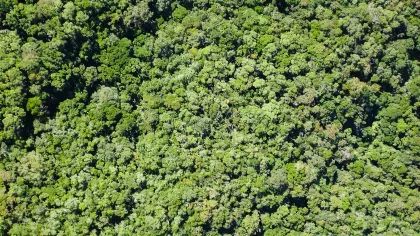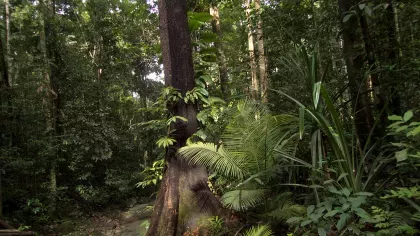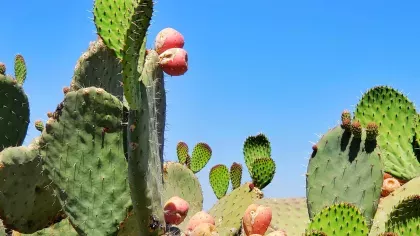4 November 2021
Working with communities to restore Mexican forests
Kew scientists are supporting local communities in Mexico to help them protect, conserve and restore their native forests.

Why trees matter
Trees are a vital part of our ecosystem, providing homes and food to a wide range of species, supporting biodiversity.
They reduce soil erosion rates and help mitigate climate change by absorbing carbon dioxide from the atmosphere.
Trees also play a crucial role in the lives of local people by providing resources like building materials, food, and medicines.
It’s no wonder that deforestation is such a severe problem. It not only affects the landscape and environment but has a knock-on effect on the people who rely on them to survive.
That’s why we are partnering with the Facultad de Estudios Superiores Iztacala of the Universidad Autónoma de Mexico (Fes-I UNAM) and NGO Pronatura Veracruz A.C. (PNV), with funding from Herbal Essences, to protect, conserve and restore forests in Mexico for the benefit of local communities.
We are working in Veracruz, located in the southeast of Mexico, a region home to ecosystems critical to biodiversity, such as pine-oak forests and tropical cloud forests.
This location is part of the Mesoamerica Biodiversity Hotspot, an area home to a high number of unique animal and plant species. But despite it being one of the richest reservoirs of biodiversity on the planet, the hotspot also faces some of the highest deforestation rates in the world.
Many trees native to Veracruz are increasingly threatened due to climate change, habitat destruction and deforestation for timber, and land-use changes for agricultural purposes.

Protecting useful native trees
Starting in 2015, Kew has been working with Fes-I UNAM to catalogue, conserve, and reintroduce native trees to Mexico.
Seeds of over 400 native tree species from across Mexico have been collected and banked at Fes-I UNAM and duplicated at Kew’s Millennium Seed Bank at Wakehurst.
Alongside PNV, we have worked with Veracruz locals to identify and locate native tree species vital to their communities.
We have collected and conserved seeds from these tree species, and we are investigating how they germinate, so they can be properly conserved in seed banks.
The seeds are germinated and grown in community-managed nurseries in Veracruz and used to reforest degraded areas.
About 20 of these species have already been propagated in the PNV’s nurseries to support different tree planting initiatives and reforestation programs in Veracruz.
Trees include a range of oak species, such as the endangered Quercus insignis and the near threatened Quercus pinnativenulosa. These form part of pine-oak forests and tropical montane cloud forest, which are a crucial part of the Mexican ecosystems.
These cloud forests occupy less than 1% of the total area of Mexico, but it’s estimated that 3,000 plant species can be found in it, representing 12% of all the species in the country.
In addition, many species of amphibians, reptiles, and birds that call the tropical montane cloud forests home are found nowhere else in the world.
Unfortunately, 90% of this forest in the project area has already been destroyed and the rest is in danger of disappearing.
These forests are home to many threatened animal species such as the bearded wood partridge (Dendrortix barbatus), Townsend's salamander (Parvimolge townsendi), and the tigrillo, or margay (Leopardus wiedii)


Harnessing the power of local people
In many of the local communities involved in this project, knowledge of which trees are useful for food, materials, and medicine, is often passed down through generations.
That is why we are making sure we involve local people in the project, to make sure the right trees are reforested, in the right areas.
Many areas in Veracruz have been reforested by using exotic species, which does more harm than good.
In January this year, a review by Kew scientists and Botanic Gardens Conservation International set out the 10 golden rules for reforestation.
Some of these rules include working with local people on reforestation projects, and making sure that native tree species are planted, as well as threatened species if possible.
We are also making sure that this project supports local women. Around 60% of people working in the local nurseries to propagate trees for replanting are women.
Female scientists are also heading up this project, with Dr Tiziana Ulian leading from Kew and Dr Patricia Dávila Aranda leading from UNAM in Mexico.
Within Veracruz, the project is led by Ms Elisa Peresbarbosa Rojas, General Director of PNV.
By working together across borders, we can help protect and restore forests that are crucial for both local communities, by providing them with sustenance and income, and the global community, by helping slow and even reverse the effects of climate change.


Replant Our Planet
The Herbal Essences ‘Replant Our Planet’ campaign aims to support the planting of native trees to support community-based reforestation activities and strengthen local communities how to use these plants for food, medicine, building materials and fuel, for generations to come.
In an innovative partnership with Herbal Essences, the Royal Botanic Gardens, Kew is supporting the campaign to highlight the benefit of restoring natural capital for the benefit of local communities.
Find out more about Replant Our Planet
Learn more about our work with Herbal Essences bio:renew range


